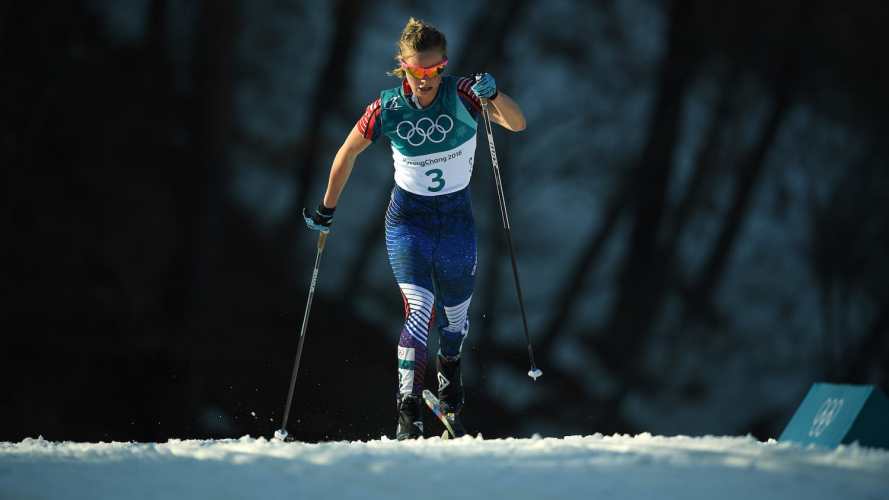Why This U.S. Olympic Skier Uses Her Platform to Fight Climate Change



After winning gold at the Olympic Winter Games PyeongChang 2018 and bronze in 2022, cross country skier Jessie Diggins wants to help save winter sports.
If U.S. Olympic gold medalist Jessie Diggins has her way, people will happily continue making snowmen and having snowball fights. However, she fears climate change will continue to erode that, and she is doing her part to ensure outdoor winter activities, including her sport — cross-country skiing — have a future. Over the last decade, winter athletes have run into a major hurdle: not having enough snow.
After competing in the Olympic Winter Games in PyeongChang, South Korea, and winning gold in the team sprint competition (a first for the U.S. in that sport), Diggins realized she had a global platform to help bring attention to how climate change impacts winter sports and the world in general. While snow was plentiful during her childhood growing up in Minnesota, allowing her to enjoy a variety of outdoor activities with her family, over the years, she witnessed climate change’s increasing negative effects.
Salesforce and Team USA
To see how data is powering Team USA’s success, check out these visualizations.



In 2016, Diggins learned of French villagers carting in blocks of ice to fabricate snow in the middle of a green field so world-class cross country skiers could compete. Last November, she traveled to the Arctic Circle for a pre-World Cup camp and noticed flowers and grass alongside a manmade trail instead of snow, to which she said, “That’s not normal.” But racing in the FIS World Ski Championships 2021 in Oberstdorf, Germany, on slush and in 70 degrees during winter was a wake-up call and has stepped up to do her part to help bring the world closer to net zero.
“Climate change is heartbreaking,” Diggins said. “But you also feel empowered because there are things you can do. There are small steps we all can take.”
Battling climate change on the frontlines
Following her 2018 gold-medal win, Diggins, who also won bronze in the women’s individual sprint in 2022, joined Protect Our Winters, a Colorado-based nonprofit organization started by pro snowboarder Jeremy Jones to protect areas where outdoor sports thrive. Today it has a global network of more than 130,000 supporters and Diggins sits on its board. That position has allowed her to speak directly to policy makers, which she did in 2018 when she visited Washington to speak directly to members of Congress.
“What I love about Protect Our Winters is that it’s not just the athlete going in the door,” Diggins said. “It’s the athlete, a scientist, and a representative who knows all the policies that are relevant.”
Diggins proudly said following their meeting, a former U.S. representative from Minnesota and a fellow cross-country skier joined the Climate Solutions Caucus. “I’m not going to pretend that was because of us, but it was cool to have that conversation with someone who also said, ‘I hear you and I care about this,’” Diggins said. “That’s been a cool way to at least make our very best effort at making a difference.”
Staying connected to her global network
Being part of a global network like Protect Our Winters takes a lot to remain connected with people in different parts of the organization.
Diggins said using a collaboration platform like Slack helps bring the 130,000 members together. The organization’s ambassadors use it to discuss upcoming votes; amplify issues across social media; and link up the organization’s various alliances.
“There’s an alliance for creatives, for scientists, and athletes,” she said. “This is a way to bring all those levels together, but also have breakout groups. This way you can see information relevant in that moment and cut to the chase when you need to.”
Businesses can directly impact climate change
All the work people like Diggins do on the ground have a big impact, but she said governments and businesses need to get more involved to enact big policy changes and investment to allow smaller changes to take hold. For example, she said businesses can help educate employees, build greener workspaces, reduce overall carbon emissions — even strategically select what banks or other companies to partner with.
“Seeing change from the top down,” Diggins said, “is really the fastest and most effective way to actually affect change.”
And with that change, Diggins and others will continue to enjoy winter sports.
“I want to protect not just the snow sport economy, but also the ability to go outside, go sledding, learn how to cross country ski, have a snowball fight,” Diggins said. “I want future generations to experience that.”
Salesforce and Team USA
Whether on the snow or inside the rink, Team USA never fails to excite their fans. And now they’re using Salesforce’s Customer 360 to dial up the wow.












